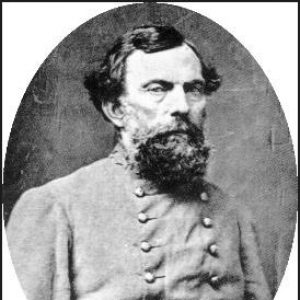calsfoundation@cals.org
Theophilus Hunter Holmes (1804–1880)
Theophilus Hunter Holmes was a lieutenant general in the Confederate army and served variously as the commander of the Trans-Mississippi Department and commander of the District of Arkansas. After he failed to regain northwestern Arkansas and saw failures at the Battle of Arkansas Post and the Battle of Helena, public confidence in his abilities evaporated. After a medical leave of absence, Holmes resigned his command of the District of Arkansas and returned to North Carolina to serve out the rest of the war.
Theophilus Holmes was born on November 13, 1804, in Sampson County, North Carolina, to Gabriel Holmes, North Carolina congressman and governor, and Mary Hunter. He graduated from the U.S. Military Academy at West Point in 1829, forty-fourth out of a class of forty-six. Following his commission, Holmes served at various posts on the frontier and later fought in the Florida Seminole Wars. During the Mexican War, he was brevetted for valor at the Battle of Monterrey. He later participated in a campaign against the Navajo in the American Southwest.
Holmes married Laura Wetmore in 1841. The couple had four sons and two daughters. Laura Holmes died in 1859.
When the Civil War broke out in April 1861, Holmes was living in New York City and serving as the superintendent of the general recruiting service for the U.S. Army. Holmes resigned his commission on April 22, 1861, and returned to North Carolina, where he cast his lot with the newly established Confederate States of America. On June 5, 1861, his old friend and admirer, Jefferson Davis, appointed him brigadier general. Shortly thereafter, Holmes was sent to Virginia and commanded a brigade at First Manassas. Following his promotion to major general in October 1861, Holmes served as commander of the Department of North Carolina. He later led a division in the Army of Northern Virginia during the Seven Days Battles.
In July 1862, Holmes was ordered to Little Rock (Pulaski County) to take command of the recently formed Trans-Mississippi Department. Strategically, the far-flung department had less military importance than those east of the Mississippi River, so Confederate officials never developed a clear strategy for maintaining the department. As a result, Holmes inherited a difficult situation. He was sent there to replace General Thomas C. Hindman, whose draconian measures had alienated much of the population. However, Hindman remained in the department as commander of the District of Arkansas. The department faced severe shortages because most men and supplies had been sent east of the Mississippi River earlier in the war. In addition, most of Holmes’s troops were inexperienced, and at least a quarter of them lacked firearms. Nevertheless, Holmes worked to develop a defensive strategy for the region and planned for an invasion of Missouri. After initially declining a promotion to lieutenant general because he felt that he had done nothing to merit it, Holmes accepted the promotion in October 1862 at the insistence of Jefferson Davis.
In early 1862, prior to Holmes’s arrival, the Union Army had moved into Arkansas with the hopes of quickly capturing Little Rock and knocking the state out of the war. The Union offensive fizzled, however, when low water on the White River and a lack of forage compelled them to abandon their drive toward Little Rock. They diverted the army to Helena (Phillips County), a thriving port city on the Mississippi River. A large Union presence, which threatened Little Rock, was soon established there. Upon taking command, Holmes was forced to divide his army in order to check an expected Union advance from the east as well as a threatened invasion from Missouri. After the December defeat of the Confederates at Prairie Grove (Washington County) in northwestern Arkansas and their retreat to Little Rock, Hindman asked to be transferred to the Army of Tennessee, leaving Holmes to shoulder much of the blame for the debacle. A month later, the Union troops captured Arkansas Post (Arkansas County) and with it nearly 5,000 Confederate troops. The two failures left both civilian and military authorities clamoring for the dismissal of Holmes. He was demoted to commander of the District of Arkansas in March 1863.
In an effort to relieve the Union siege of Vicksburg and redeem his tarnished name, Holmes attacked the Union garrison at Helena on July 4, 1863. His unclear orders led to an unsuccessful, uncoordinated assault that produced heavy casualties. A dejected Holmes took a medical leave of absence shortly thereafter. Following the capture of Little Rock by Union forces in September 1863, Holmes returned to duty. Unfortunately, his defeat at Helena, combined with his previous losses, led many to resume the call for his removal from command. In January 1864, Kirby Smith wrote to Jefferson Davis and asked for Holmes to be replaced. Angered by this slight, Holmes resigned the next month before getting Davis’s response.
Holmes returned to his home state, where he was placed in command of the North Carolina Reserves. Following the war, he retired to a farm in Fayetteville, North Carolina. He died on June 20, 1880.
For additional information:
Castel, Albert. “Theophilus Holmes: Pallbearer of the Confederacy.” Civil War Times Illustrated 16 (July 1977): 11–17.
Demilio, Jenny Jobe. “Theophilius Hunter Holmes: ‘An Active Life of Plenty.” PhD diss., University of Memphis, 2016. Online at https://digitalcommons.memphis.edu/etd/2295/ (accessed June 21, 2022).
Wakelyn, Jon L. Biographical Dictionary of the Confederacy. Westport, CT: Greenwood Press, 1977.
Warner, Ezra J. Generals in Gray. Baton Rouge: Louisiana State University Press, 1959.
Williams, Nancy A., ed. Arkansas Biography: A Collection of Notable Lives. Fayetteville: University of Arkansas Press, 2000.
Brian K. Robertson
Butler Center for Arkansas Studies


 Theophilus Holmes
Theophilus Holmes 



General Holmes’s seventeen-year-old son T. H. Holmes Jr. served as his aide-de-camp while in Arkansas. T. H. Jr. returned east with his father in early 1864 and soon left North Carolina to serve in Virginia. T. H. Jr. was killed at Ashland Courthouse on June 1, 1864, during the Cold Harbor campaign. He was nineteen. His body was never recovered. Gen. T. H. Sr. upon hearing the news traveled to Richmond to try to bring his son home. Gen. Holmes was unsuccessful.